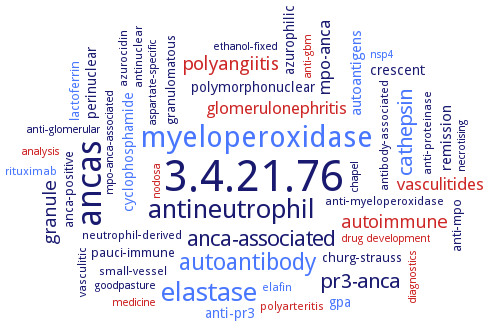3.4.21.76: Myeloblastin
This is an abbreviated version!
For detailed information about Myeloblastin, go to the full flat file.

Word Map on EC 3.4.21.76 
-
3.4.21.76
-
ancas
-
myeloperoxidase
-
elastase
-
antineutrophil
-
autoantibody
-
anca-associated
-
cathepsin
-
pr3-anca
-
polyangiitis
-
autoimmune
-
granule
-
glomerulonephritis
-
mpo-anca
-
vasculitides
-
remission
-
autoantigens
-
anti-pr3
-
perinuclear
-
polymorphonuclear
-
cyclophosphamide
-
azurophilic
-
gpa
-
crescent
-
anti-mpo
-
anca-positive
-
lactoferrin
-
pauci-immune
-
churg-strauss
-
granulomatous
-
elafin
-
vasculitic
-
anti-myeloperoxidase
-
rituximab
-
small-vessel
-
antibody-associated
-
azurocidin
-
anti-proteinase
-
neutrophil-derived
-
polyarteritis
-
antinuclear
-
mpo-anca-associated
-
ethanol-fixed
-
goodpasture
-
drug development
-
diagnostics
-
chapel
-
medicine
-
analysis
-
nsp4
-
aspartate-specific
-
necrotising
-
nodosa
-
anti-gbm
-
anti-glomerular
- 3.4.21.76
-
ancas
- myeloperoxidase
- elastase
-
antineutrophil
- autoantibody
-
anca-associated
- cathepsin
-
pr3-anca
- polyangiitis
- autoimmune
- granule
- glomerulonephritis
-
mpo-anca
- vasculitides
-
remission
- autoantigens
- anti-pr3
-
perinuclear
-
polymorphonuclear
- cyclophosphamide
-
azurophilic
- gpa
-
crescent
-
anti-mpo
-
anca-positive
- lactoferrin
-
pauci-immune
-
churg-strauss
-
granulomatous
- elafin
-
vasculitic
-
anti-myeloperoxidase
- rituximab
-
small-vessel
-
antibody-associated
-
azurocidin
-
anti-proteinase
-
neutrophil-derived
- polyarteritis
-
antinuclear
-
mpo-anca-associated
-
ethanol-fixed
-
goodpasture
- drug development
- diagnostics
-
chapel
- medicine
- analysis
- nsp4
-
aspartate-specific
-
necrotising
- nodosa
- anti-gbm
-
anti-glomerular
Reaction
Hydrolysis of proteins, including elastin, by preferential cleavage: -Ala-/- > -Val-/- =
Synonyms
AGP7, C-ANCA antigen, hPR-3, human leukocyte proteinase 3, human PR3, human proteinase 3, Leukocyte proteinase 3, Leukocyte proteinase 4, membrane proteinase 3, membrane-associated proteinase 3, mP3, mPR3, myeloblastin, neutrophil protease PR3, neutrophil proteinase 3, neutrophil serine protease, neutrophilic serine protease proteinase 3, P29, p29b, PMNL proteinase, Pr 3, PR-3, PR3, protease 3, proteinase 3, Proteinase PR-3, Proteinase-3, proteinase3, PRTN3, SAP3, secreted aspartic proteinase 3, surface proteinase 3, Wegener autoantigen, Wegener's autoantigen, Wegener's granulomatosis autoantigen, Xenopus PR3, xPR-3


 results (
results ( results (
results ( top
top






